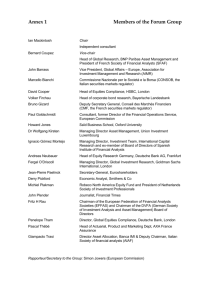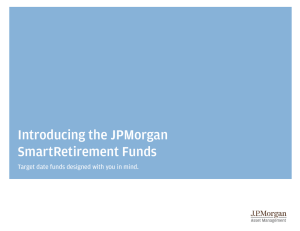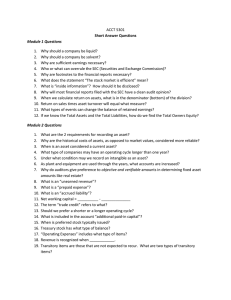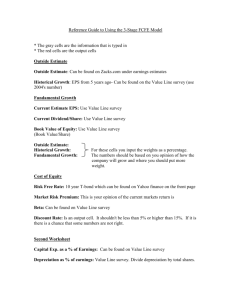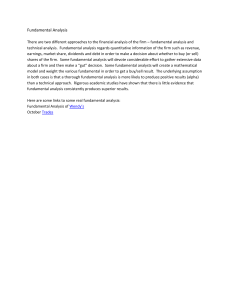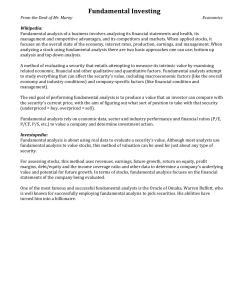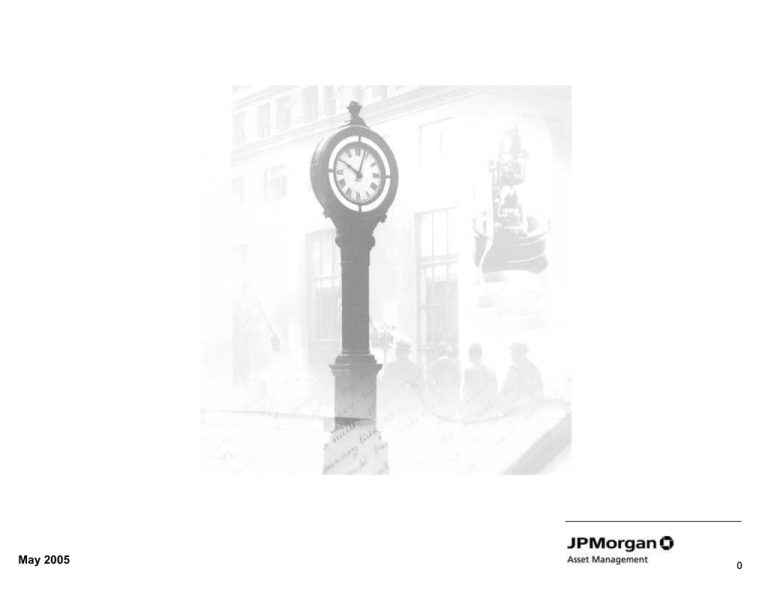
May 2005
0
Asset & Wealth Management
2004 Proforma Operating Results ($mm)
Revenue
Credit Costs
Expenses
Operating Earnings
Pre-- tax Margin
ROE
1
(12/31/04)
Key Statistics
1
1
2004 Revenue by Business Segment
2004
4901
(16)
3,542
879
28%
37%
Retail
24%
Private
Client Svcs
21%
Institutional
23%
Private Bank
32%
Leadership Positions
n $1.3T of assets under supervision
n #1 U.S./#3 Global Private Bank
n $791B of AUM
n #2 Global money market asset manager
n $328B of mutual fund assets
n #3 U.S. active asset manager
n $25B of avg. loans
n #5 U.S. mutual fund company
n 12,300 employees
n #2 offshore fund manager
Annual comparison
1
JPMorgan Asset Management
Key Global Facts
One of the top 5 active managers in the world and top 10 overall by size
Highly diversified by asset class and client group
Multiple investment processes to meet broad client needs
3,000 institutions served globally, 2.2 million retail clients, 200,000 online brokerage
customers through BrownCo and 850,000 401(k) participants through JPMorgan Invest
Over 4,000 employees worldwide
2
What we stand for: Global Business Principle
UNDERSTAND
FIDUCIARY
RESPONSIBILITY
EXECUTE
ADVISE
ALPHA GENERATION
CLIENT SOLUTIONS
Our Fiduciary Responsibility defines our relationship with our
clients and informs every decision we take on their behalf
3
Our U.S. Equity research investment philosophy:
Fair Value vs. Stock Price
• Stock prices ultimately reflect future
earnings and cash flows
Valuation
Fair value
• Stocks are frequently mispriced by the market
relative to their true long-term value
• A disciplined investment process that exploits
mispricings can deliver superior investment
results
Actual
Stock Price
Time
4
Our philosophy is implemented through a unique and robust
investment process
Information
Advantage
Systematic
Valuation
Fundamental Research
Dividend Discount Model
• U.S. analyst team of 20 buyside, sector-specialists
• Proprietary earnings and cash
flow estimates drive DDR
• Global network of analysts
expands our information sources
• Stocks ranked into quintiles
based on DDRs
Disciplined
Portfolio
Construction
Stock Selection Focused
• Minimize uncompensated risks
(beta, sector, style)
5
The research analyst position at JPMorgan Asset Management
is distinct
Buy-side
Network
• Insights generated exclusively
for client benefit
• 20 U.S. analysts in New York
• Compensation driven by alpha
creation within sector
JPMorgan
Asset
Management
research analyst
• 90 analysts worldwide utilizing
same methodology
Central
• Analyst role is a “career”
position
• $80 mm investment in global
research network annually
Note: As of March 31, 2005
6
JPMorgan’s global network allows U.S. analysts to better
understand U.S. companies
Success in local markets requires a local presence and a global perspective
Example: Global Technology Team
Luke Szymczak
Nitin Bhambhani
Rob Bowman
Biral Devani
Christian Pecher
North America — Large cap
(New York)
Equity analysts
Average years in industry
20
13
Paul Chan
Europe & UK
(London)
Equity analysts
Average years in industry
Kaoru Kobu
Kentaro Sasaki
Hiroyuki Shigemasa
18
11
Pacific Rim (ex Japan)
(Singapore)
Equity analysts
Average years in industry
5
11
Global Emerging Markets
Japan
(Tokyo)
Equity analysts
Average years in industry
16
12
Equity analysts*
Average years in industry
36
12
*Includes Combined PM/Analysts
As of March 31, 2005
7
Our philosophy is implemented through a unique and robust
investment process
Information
Advantage
Systematic
Valuation
Disciplined
Portfolio
Construction
Fundamental Research
Dividend Discount Model
Stock Selection Focused
• U.S. analyst team of 20 buyside, sector-specialists
• Proprietary earnings and cash
flow estimates drive DDR
• Minimize uncompensated risks
(beta, sector, style)
• Global network of analysts
expands our information sources
• Stocks ranked into quintiles
based on DDRs
8
Systematic Valuation
Earnings
Long term
earnings
power
Actual near
term
earnings
• Stock prices should reflect expectations of
future earnings and cash flows
• “Normalized,” sustainable earnings reflect
true investment value
Time
Actual
Today
Forecasted
9
Our analysts’ forecasts for normalized earnings and growth
drive a stock’s Dividend Discount Rate (DDR) ranking
As of January 13, 2005
Semiconductors sector: JPMorgan ranking by long-term value
DDR
Future
Today’s
price:
$17.94
2004
2006
2011
...
Quintile 1
Altera
Analog Devices
Xilinx
Intersil
7.77
7.60
7.55
7.48
Quintile 2
Microchip Technology
Maxim Integrated
Linear Technology
Applied Materials
7.36
7.27
7.26
7.20
Novellus
Qualcomm
Kla-Tencor
Texas Instruments
Broadcom
7.18
7.17
7.16
7.14
7.12
Quintile 4
National Semiconductor
Intel
Teradyne
Agere Systems
7.09
6.97
6.96
6.95
Quintile 5
Micron Technology
LSI Logic
Sandisk
Advanced Micro Devices
6.80
6.77
6.70
6.31
2033
Example: Altera
Quintile 3
Market price
$17.94
Normalized earnings
$0.88
Earnings growth
13.50%
DDR
7.77 %
Note: A DDR establishes relative valuations among companies only and does not represent the stock's expected actual
return within any given time period. Quintiles are 20% by number of names, not capitalization. The information on this
page is for example purposes only and does not necessarily reflect current estimates.
10
Our quintile rankings have demonstrated strong predictive
power over time
January 1, 1986 – December 31, 2004
Quintile performance vs. S&P 500
6%
4%
2%
0%
-2%
-4%
-6%
-8%
Quintile 1
Quintile 2
Quintile 3
Quintile 4
Quintile 5
Source: JPMorgan Asset Management
Active DDRs represent DDRs which include +/- adjustment and prior to that A-rating adjustment.
Chart shows performance of quintiles (as determined by JPMorgan research universe) versus the S&P 500 Index, with quintiles rebalanced
monthly: each sector is market weighted. Quintile performance represents the average returns of quintles vs. the annual median sector returns of
the S&P 500 averaged over the full time period. Quintile performance results have certain inherent limitations. Unlike an actual performance record,
quintile results do not represent actual trading, liquidity constraints, fee schedules and transaction costs. No representation is being made that any
portfolio will or is likely to achieve profits or losses similar to those shown. Past performance is not indicative of future results.
11
Our philosophy is implemented through a unique and robust
investment process
Information
Advantage
Systematic
Valuation
Disciplined
Portfolio
Construction
Fundamental Research
Dividend Discount Model
Stock Selection Focused
• U.S. analyst team of 20 buyside, sector-specialists
• Proprietary earnings and cash
flow estimates drive DDR
• Minimize uncompensated risks
(beta, sector, style)
• Global network of analysts
expands our information sources
• Stocks ranked into quintiles
based on DDRs
12
Large Cap U.S. Equity: Research Focused Strategies
Targeted excess return and tracking error
4
Target excess return
Research Market Neutral
Large Cap Core
Plus
3
Large Cap Core,
Value, Growth
2
REI 250
REI 150
1
REI 100
Structured strategies
Active strategies
0
0
1
2
3
4
5
6
Target incremental risk - tracking error
*As of March 31, 2005
Note: Targets are relative to the strategies’ respective benchmarks and are gross of fees. Expected returns are
estimates based upon proprietary research. There is no guarantee that target returns will be achieved. See appendix for
additional information.
13
Style neutrality is tightly maintained
36-month moving windows, computed monthly
Manager Style January 1999 – December 2004
Zephyr StyleADVISOR
Large
Large Cap Core Equity
rvalue
rgrowth
r2value
r2growth
Russell Generic Corners
1
0
-1
Small
Value
Zephyr StyleADVISOR: JPMorgan Asset Management
-1
0
1
Growth
14
DDR Spread
DDR Q1 & Q2 Average vs Large Cap Coverage
Sector Neutral
Eq Weighted
11.0%
10.0%
9.0%
8.0%
7.0%
6.0%
5.0%
4.0%
3.0%
Jan-05
Jan-04
Jan-03
Jan-02
Jan-01
Jan-00
Jan-99
Jan-98
Jan-97
Jan-96
Jan-95
Jan-94
Jan-93
Jan-92
Jan-91
Jan-90
Jan-89
Jan-88
Jan-87
Jan-86
2.0%
Last Date 2/28/2005
15
Equity Market Valuation
Equity Risk Premium and Real DDR
8.0%
6%
7.5%
Real DDR
4%
6.5%
6.0%
3%
5.5%
ERP
Real DDR
5%
ERP
7.0%
2%
5.0%
ERP
Real DDR
4.5%
Overall Avg.
3.0%
6.2%
Mar 2005
3.6%
5.6%
1%
4.0%
0%
86
88
90
92
94
96
98
00
02
04
• The equity risk premium (ERP) is the bottom-up aggregated DDR minus the 10-year Treasury yield. It measures
the relative attractiveness of stocks versus bonds.
• Currently, the ERP of 3.6% is above the long term average of 3.0%.
• The real DDR, an absolute rather than a relative measure of value, remains below its long term average.
16
JPMorgan Asset Management
This document is intended solely to report on various investment views held by
JPMorgan Asset Management. Opinions, estimates, forecasts, and statements of
financial market trends that are based on current market conditions constitute our
judgment and are subject to change without notice. We believe the information
provided here is reliable but should not be assumed to be accurate or complete.
The views and strategies described may not be suitable for all investors.
References to specific securities, asset classes and financial markets are for
illustrative purposes only and are not intended to be, and should not be
interpreted as, recommendations. Indices do not include fees or operating
expenses and are not available for actual investment. The information contained
herein employs proprietary projections of expected returns as well as estimates
of their future volatility. The relative relationships and forecasts contained herein
are based upon proprietary research and are developed through analysis of
historical data and capital markets theory. These estimates have certain inherent
limitations, and unlike an actual performance record, they do not reflect actual
trading, liquidity constraints, fees or other costs. References to future net returns
are not promises or even estimates of actual returns a client portfolio may
achieve. The forecasts contained herein are for illustrative purposes only and are
not to be relied upon as advice or interpreted as a recommendation.
The value of investments and the income from them may fluctuate and your
investment is not guaranteed. Past performance is no guarantee of future results.
Please note current performance may be higher or lower than the performance
data shown. Please note that investments in foreign markets are subject to
special currency, political, and economic risks. Exchange rates may cause the
value of underlying overseas investments to go down or up. Investments in
emerging markets may be more volatile than other markets and the risk to your
capital is therefore greater. Also, the economic and political situations may be
more volatile than in established economies and these may adversely influence
the value of investments made.
The following is an example of the effect of compounded advisory fees
over a period of time on the value of a client’s portfolio: A portfolio with a
beginning value of $100 million, gaining an annual return of 10% per
annum would grow to $259 million after 10 years, assuming no fees have
been paid out. Conversely, a portfolio with a beginning value of $100
million, gaining an annual return of 10% per annum, but paying a fee of 1%
per annum, would only grow to $235 million after 10 years. The annualized
returns over the 10 year time period are 10.00% (gross of fees) and 8.91%
(net of fees). If the fee in the above example was 0.25% per annum, the
portfolio would grow to $253 million after 10 years and return 9.73% net of
fees. The fees were calculated on a monthly basis, which shows the
maximum effect of compounding.
Illustration showing impact of investment management fees: An investment
of USD $1,000,000 under the management of JPMFAM achieves a 10%
compounded gross annual return for 10 years. If a management fee of
0.75% of average assets under management were charged per year for
the 10-year period, the annual return would be 9.25% and the value of
assets would be USD $2,422,225 net of fees, compared with USD
$2,593,742 gross of fees. Therefore, the investment management fee, and
any other expenses incurred in the management of the portfolio, will
reduce the client’s return.
The securities mentioned throughout the presentation are shown for
illustrative purposes only and should not be interpreted as
recommendations to buy or sell. A full list of firm recommendations for the
past year are available upon request.
JPMorgan Asset Management is the marketing name for the asset
management businesses of JPMorgan Chase & Co and its affiliate
worldwide.
Copyright 2005 JPMorgan Chase & Co. All rights reserved.
Performance results are gross of investment management fees. The deduction of
an advisory fee reduces an investor’s return. Actual account performance will
vary depending on individual portfolio security selection and the applicable fee
schedule. Fees are available upon request.
17

